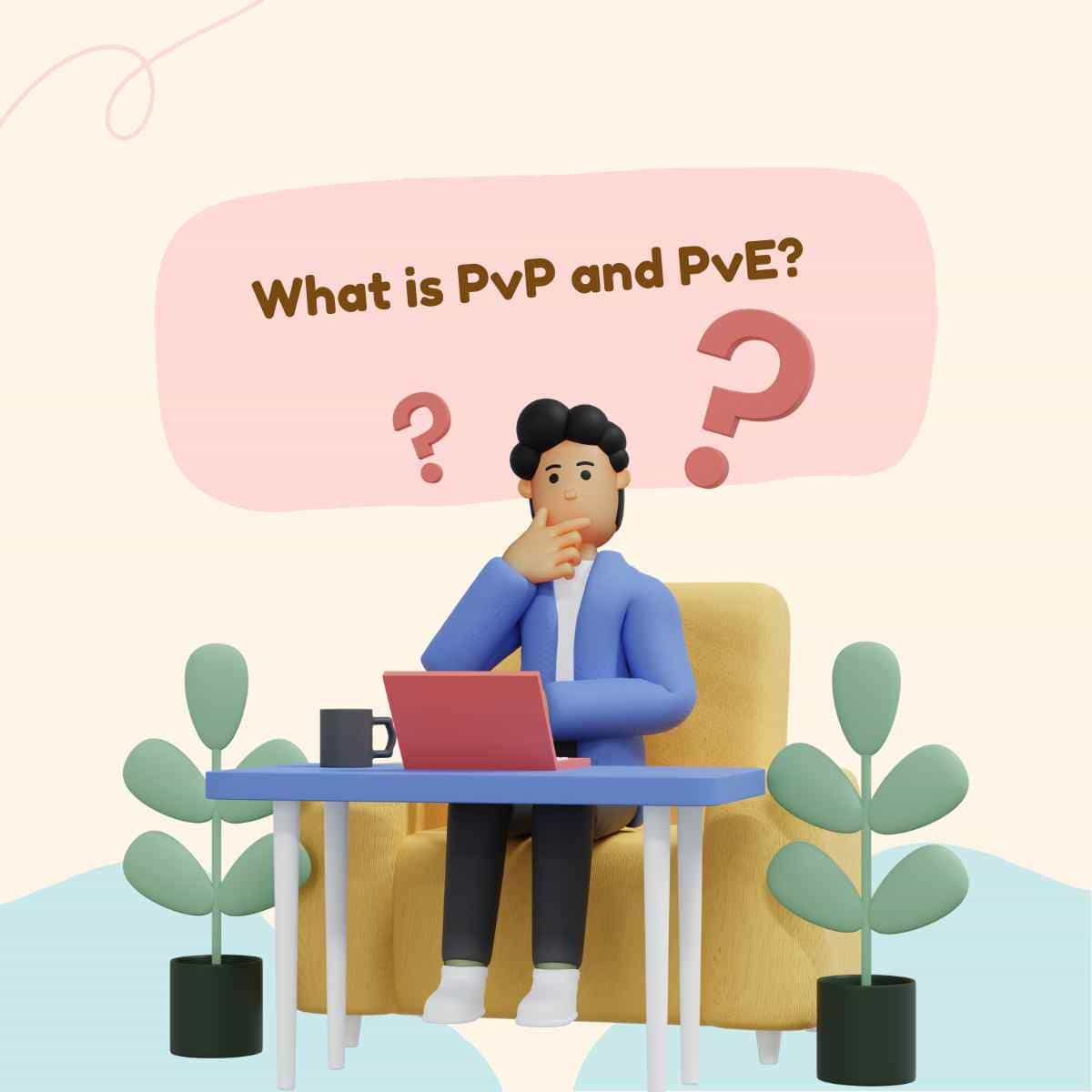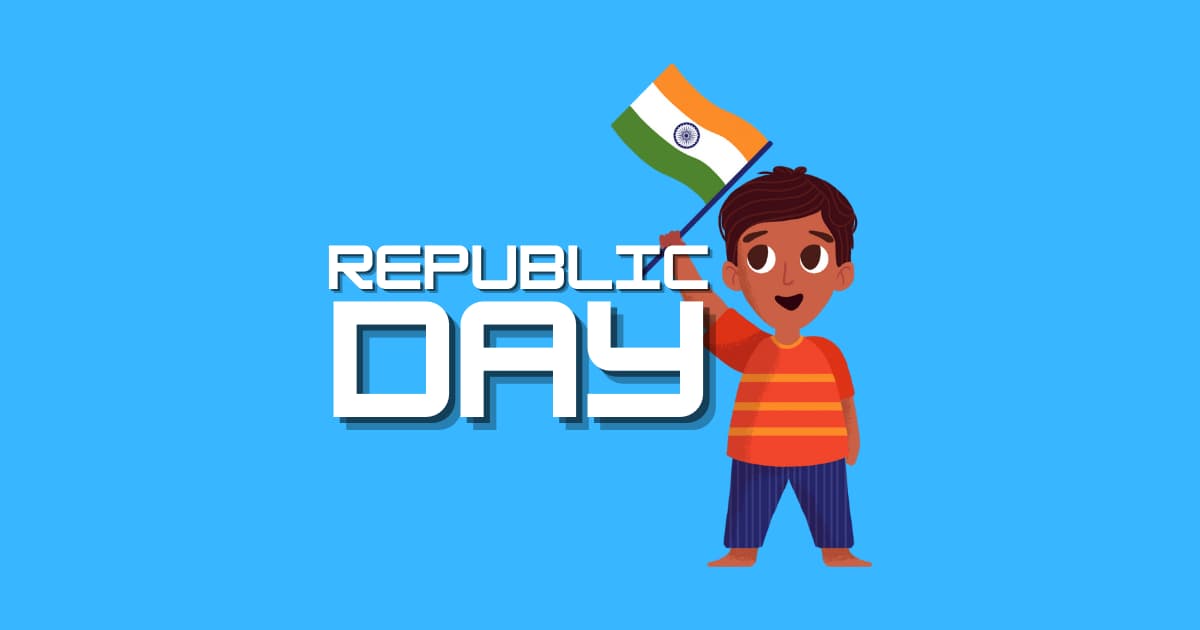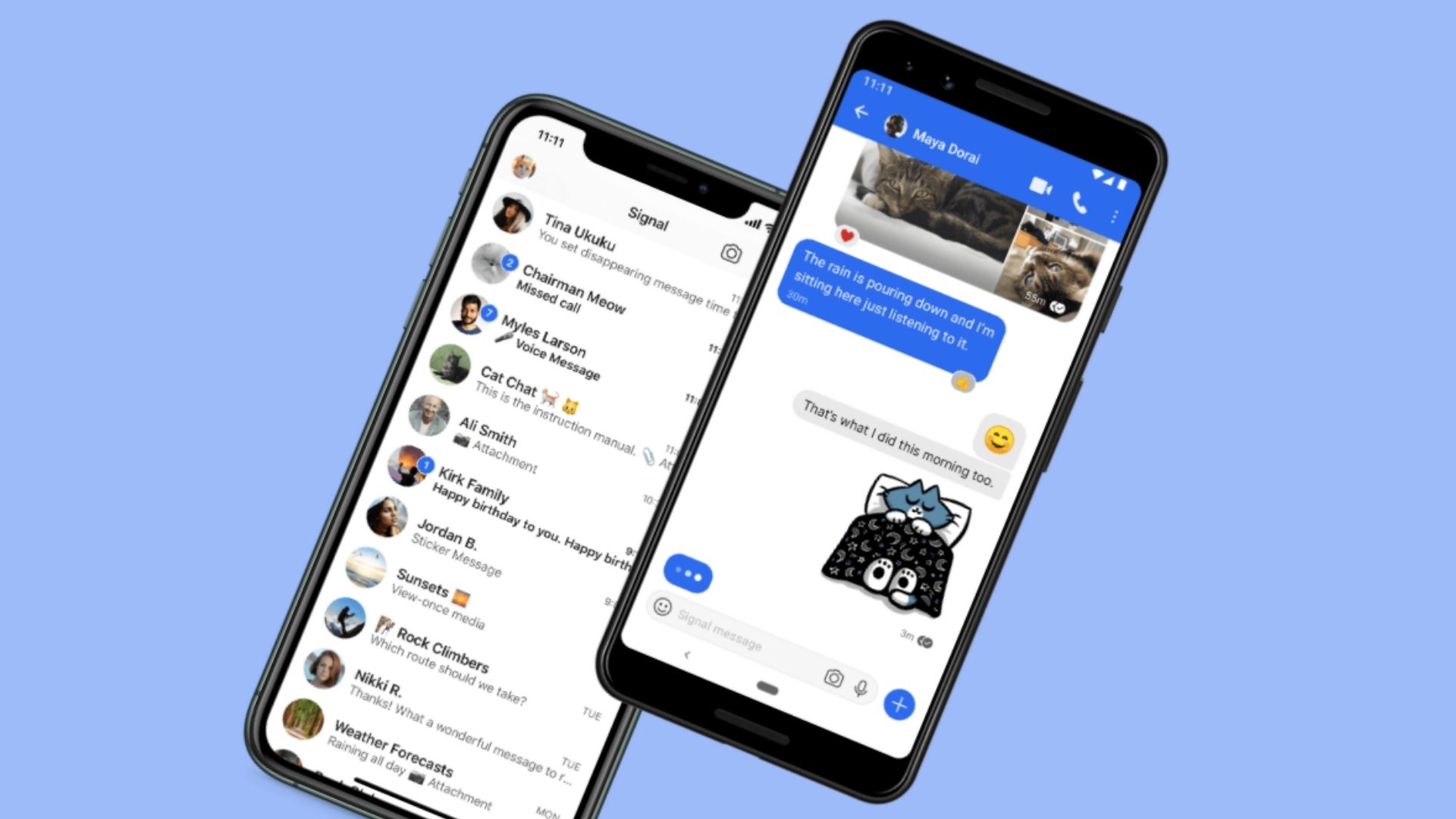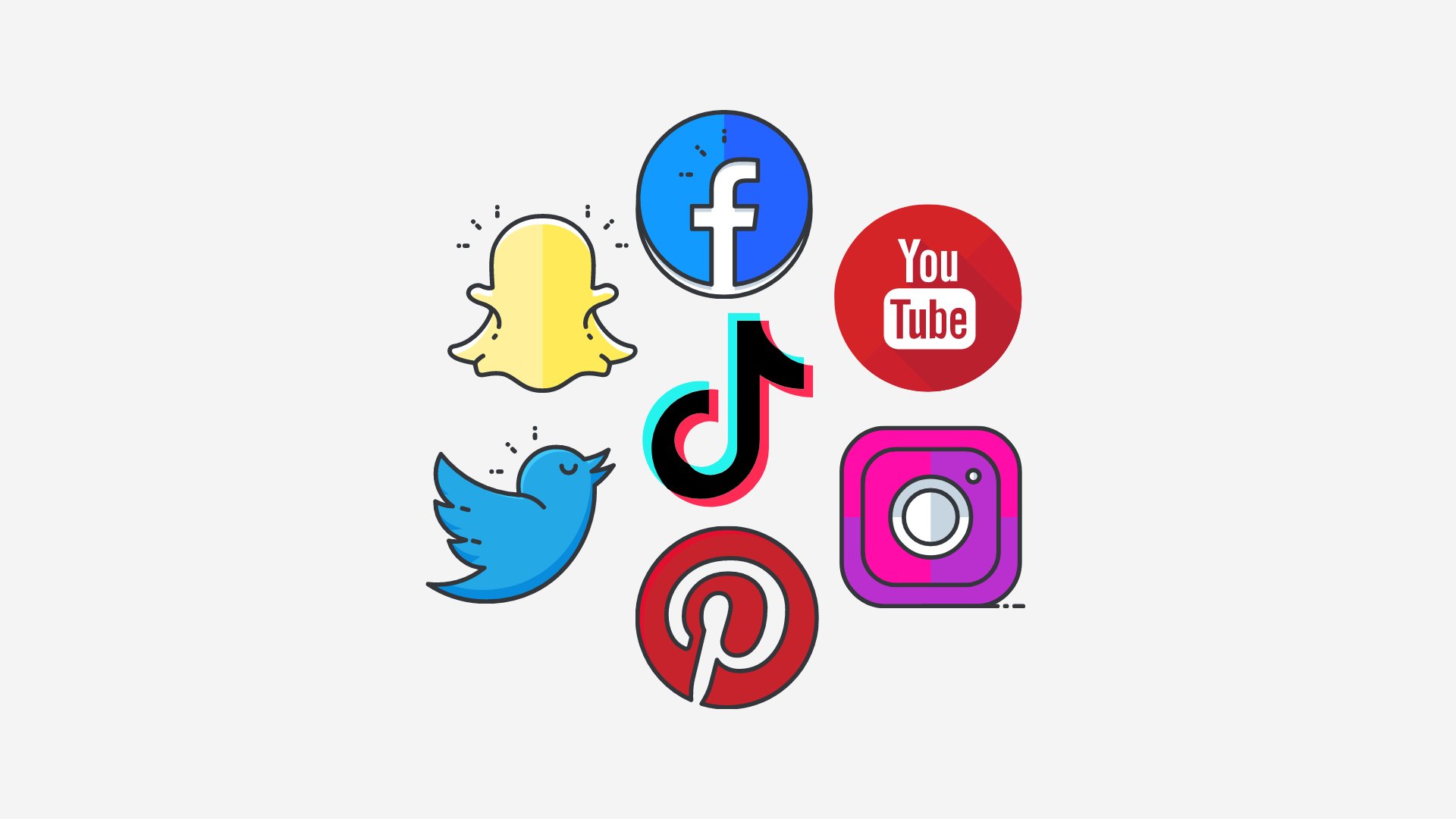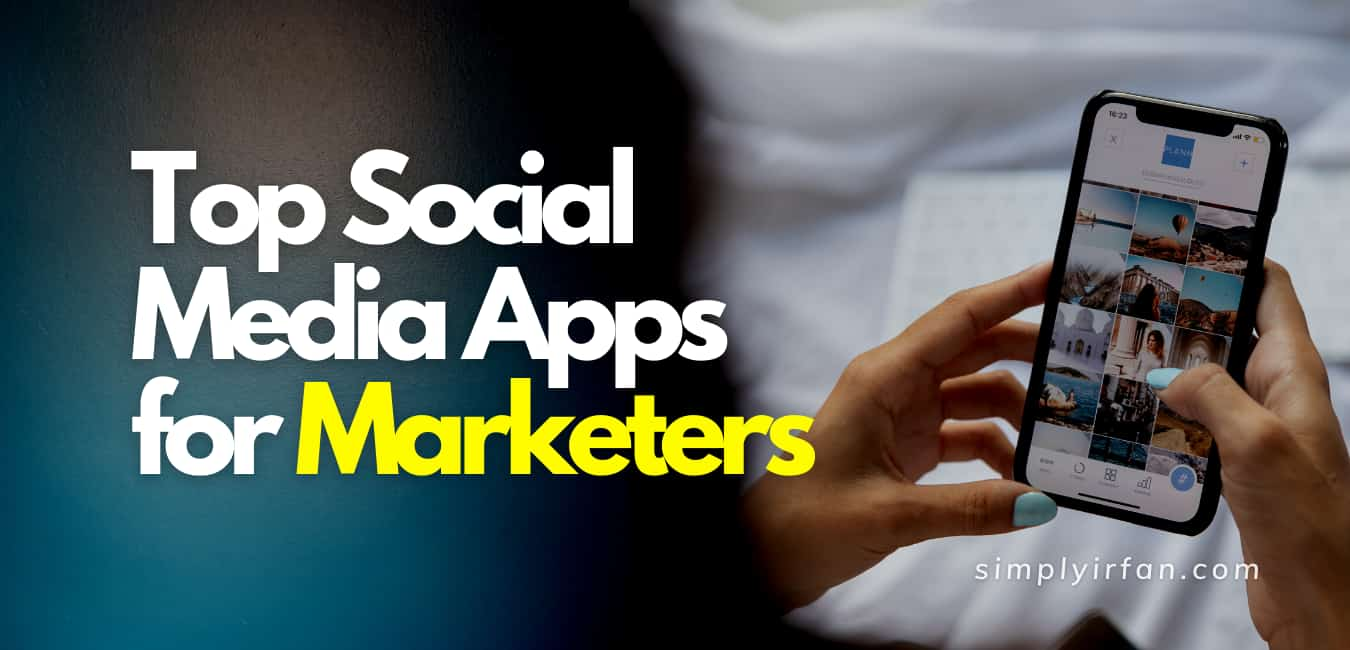PvP stands for Player versus Player, while PvE stands for Player versus Environment. These terms are commonly used in online gaming communities to describe different modes or styles of gameplay. In PvP, players compete directly against each other, testing their skills, strategies, and reflexes in battles or competitions. PvE, on the other hand, involves players working together to overcome challenges presented by the game’s environment, such as computer-controlled enemies, obstacles, or puzzles.
PvP vs PvE
- Opponents: In PvP, players face off against other human players, each controlling their own character or team. In PvE, players collaborate to overcome challenges presented by the game’s artificial intelligence (AI) or scripted events.
- Objective: The objective in PvP is typically to defeat or outperform other players, whether through combat, competition, or other means. In PvE, the objective is often to complete missions, quests, or raids by defeating AI-controlled enemies or overcoming environmental obstacles.
- Cooperation: PvP tends to emphasize individual skill and competitiveness, while PvE often requires teamwork and cooperation among players to succeed.
- Dynamicity: PvP matches can be highly dynamic and unpredictable due to the actions of human opponents, while PvE encounters are usually more scripted or predictable, though they may still require adaptation to changing circumstances.
Examples:
- PvP Examples: Games like “Fortnite,” “Call of Duty,” and “League of Legends” feature PvP modes where players compete against each other in various formats such as deathmatches, battle royale, or team-based matches.
- PvE Examples: Games like “World of Warcraft,” “Destiny,” and “Monster Hunter” feature PvE content where players team up to complete quests, defeat boss monsters, or explore dungeons filled with AI-controlled enemies.
PvP, or Player versus Player, isn’t typically a feature found directly on social media platforms themselves. Instead, PvP gaming experiences are often hosted on dedicated gaming platforms such as consoles, PC gaming clients like Steam, or specific game launchers such as Epic Games Store or Origin.
PvP Social Media
In the vast digital realm of gaming, PvP, or Player versus Player, isn’t just about in-game battles; it’s a thriving community pulsating with energy, strategy, and camaraderie across various social media platforms.
Across platforms like Reddit, Discord, and Twitter, PvP enthusiasts converge to exchange tactics, dissect gameplay mechanics, and engage in spirited discussions. These social hubs serve as virtual arenas where players hone their skills, stay updated on meta shifts, and forge alliances with like-minded competitors. From theorycrafting optimal builds to analyzing the latest patch notes, PvP social media channels buzz with the excitement of continuous improvement and strategic mastery.
- Competitive Communities: PvP-focused social media groups and forums are often filled with discussions about strategies, tactics, and the competitive scene of the game.
- Highlight Reels: Players share their most thrilling PvP moments, such as clutch plays, epic victories, or intense battles, to showcase their skills and entertain others.
- Tournament Announcements: Social media platforms are used to promote PvP tournaments, leagues, and esports events, with updates on schedules, prize pools, and participating teams.
- Trash Talk and Banter: PvP communities sometimes engage in friendly banter and trash talk, adding to the competitive atmosphere and camaraderie among players.
- Developer Interaction: PvP players often use social media to engage directly with game developers, discussing balance changes, providing feedback, and suggesting improvements to enhance the PvP experience.
PvE Social Media
In the enchanting realms of PvE, or Player versus Environment, social media platforms become gateways to immersive worlds brimming with teamwork, discovery, and shared triumphs. Explore the vibrant online communities where players unite to conquer challenges, uncover mysteries, and craft unforgettable narratives amidst the virtual landscapes of cooperative gaming.
Within the realms of Reddit, Discord, and Facebook Groups, PvE aficionados gather to exchange strategies, offer guidance, and celebrate cooperative victories. These digital sanctuaries serve as rallying points where adventurers unite, forming bonds forged in the fires of shared quests and epic battles. From sharing tips on overcoming daunting boss encounters to organizing expeditions into uncharted territories, PvE social media platforms pulsate with the collective heartbeat of exploration and camaraderie.
- Cooperative Communities: PvE-focused social media groups and forums foster a sense of teamwork and cooperation, with players sharing tips, guides, and strategies for overcoming in-game challenges.
- Guide Sharing: Players create and share guides, tutorials, and walkthroughs to help others navigate complex PvE content, such as raids, dungeons, or puzzles.
- Event Coordination: PvE communities use social media platforms to organize group activities, such as raid parties, dungeon runs, or seasonal events, coordinating schedules and recruiting participants.
- Storytelling and Lore Discussion: PvE players often delve into the lore and narrative of the game, discussing plot twists, character development, and hidden secrets revealed through PvE content.
- Developer Engagement: PvE communities provide feedback to developers on game mechanics, quest design, and PvE content updates, with discussions focused on enhancing the immersive and narrative-driven aspects of the game.
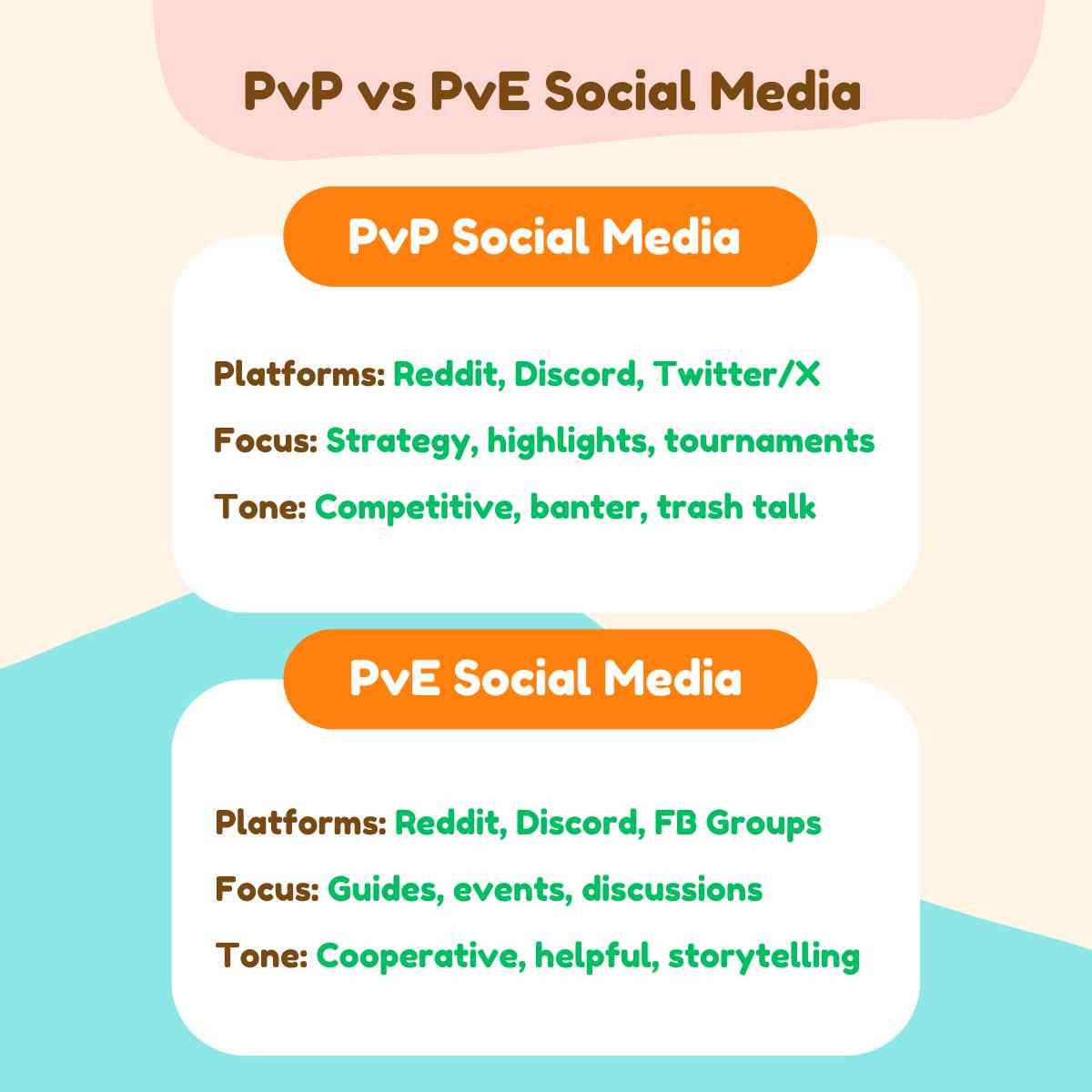
In summary, while both PvP and PvE communities use social media to connect, share content, and engage with developers, the tone and focus of discussions differ based on the competitive or cooperative nature of the gameplay experience. PvP social media tends to emphasize competition, highlight reels, and tournament announcements, while PvE social media focuses on cooperation, guide sharing, event coordination, and storytelling.
Here are some examples of social media platforms commonly used by PvP gamers:
- Reddit: Subreddits dedicated to specific PvP games or genres serve as hubs for discussion, strategy sharing, and community engagement. Players can join subreddits like r/FortniteCompetitive or r/leagueoflegends to discuss tactics, share highlights, and stay updated on the latest PvP news.
- Discord: Discord servers are popular among PvP communities for real-time communication, organizing teams, and coordinating matches or tournaments. Many gaming organizations and esports teams host Discord servers where players can join to find teammates, discuss strategies, and participate in community events.
- Twitter: PvP players, esports organizations, and game developers often use Twitter to share announcements, updates, and highlights from competitive matches. Players can follow their favorite players, teams, or game developers to stay informed about PvP events, patch notes, and upcoming tournaments.
- Twitch: While primarily a streaming platform, Twitch also serves as a social hub for PvP enthusiasts to watch live gameplay, interact with streamers, and engage with other viewers in chat. PvP players often stream their matches, providing commentary, analysis, and entertainment for their audience.
- Facebook Groups: Many PvP gaming communities have dedicated Facebook groups where players can join to discuss strategies, share content, and find teammates for matches or events. These groups provide a platform for players to connect with like-minded individuals and participate in community-driven activities.
- YouTube: PvP players create and share gameplay videos, tutorials, and highlight reels on YouTube, showcasing their skills and entertaining their audience. Viewers can subscribe to PvP-focused channels to stay updated on the latest content and strategies in their favorite games.
While each platform serves a different purpose, they collectively contribute to the vibrant PvP gaming community by facilitating communication, content sharing, and community engagement among players passionate about competitive gaming.
